|
The
scorecard read 44 for 2. Sachin Tendulkar, variously called Master
Blaster and Little Master, had faced two balls. Dilhara Fernando
raced in and bowled one that pitched outside the off stump and
swung in, Tendulkar played forward. Instead of the sweet sound
of cherry hitting willow, there was the deafening sound of the
ball crashing into his leg stump. The "World's Best Batsman"
was out for a duck. That scene, played and replayed on millions
of TV screens in India, and across the world, was, to many, the
defining picture of India's World Cup campaign. For the Men in
Blue, the quest for cricket's Holy Grail was, for all intents
and purposes, over.
The boys (it's funny how no captain or coach
has ever referred to Indian cricketers as "men") are
now back home, their reputations in tatters, their bluster gone
and their futures uncertain. The debate over their performance
(or the abject lack of it) will continue.
The fans are angry. And India Inc is angrier.
The former feel an emotional void, betrayed both by their hopes
and their heroes; the latter has taken a hit on its bottom line,
let down by an over-hyped bunch of players to whom it had hitched
its fortune.
THE BIG SPONSORS
Here's what the big guys of Global Inc.
have committed to cricket |
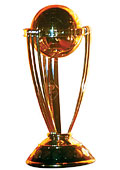 Official
global sponsors Official
global sponsors
LG: $70 million for two World Cups and three
Champions Trophy tournaments
Pepsi: $70 million for two World Cups and three Champions
Trophy tournaments
Hero Honda: $40 million for two World Cups and three
Champions Trophy tournaments
Hutch: $20 million for two World Cups and three Champions
Trophy tournaments
Official sponsors*
Indian Oil: $2-4 million
Cable & Wireless: $2-4 million
VISA: $2-4 million
Scotiabank: $2-4 million
Johnnie Walker: $2-4 million
Red Stripe: $2-4 million
Standard Bank: $2-4 million
Note: The
two on-air co-sponsors are Nokia and Pepsi while the associate
sponsors are ITC Foods, LG, Videocon, Hero Honda, Aditya
Birla Group, Maruti and the UB Group. These deals have been
struck only for World Cup 2007 and the most recent Champions
Trophy. It is gathered that the cost for each of these sponsors
is in the range of Rs 22-28 crore.
* Only for the 2007 World Cup
|
A Losing Proposition
"Cricket is a losing proposition in
today's context and it is clear that we have to be careful when
we decide to spend on the game the next time," says Videocon
Group Chairman Venugopal Dhoot, echoing the sentiments of all
the big spenders on the game. His company, which has Mahendra
Singh Dhoni as brand ambassador, is one of the seven on-air associate
sponsors for the World Cup. The scenario looks grim. With India
out, the viewership numbers will almost definitely take a beating.
"Eyeballs could fall by as much as 40-50 per cent,"
thinks S. Yesudas, coo, Media Direction, the media services group
of RK Swamy BBDO. His agency has done the media buying and planning
for BSNL, Raymond and visa, among others.
Sony Entertainment Television (SET), the
official broadcaster, which has paid the International Cricket
Council (ICC) an estimated $250 million (Rs 1,100 crore) for two
World Cups-2003 and 2007-and three Champions Trophy tournaments
between 2000 and 2007, is already feeling the heat.
It has sold spots worth Rs 350 crore for
this World Cup (See Sony's Ad Rates). Of this, about 30 per cent
was lapped up by Indian companies, which now want out, or, at
the very least, want discounts. But Sony rules out the possibility.
"When you gamble at a casino, you can win or lose. You do
not ask for a refund if you lose," says Kunal Dasgupta, CEO,
SET. But advertisers are adamant. "Unless rates fall by at
least 25 per cent, it will be hard to justify the spend,"
says Yesudas.
One formula that is being bandied about involves
Sony offering advertisers more free commercial time (FCT), free
sponsorships on other shows on the network or spreading out the
funds committed beyond the World Cup. Sony, obviously, will have
to negotiate a discount from the ICC before it can offer any largesse
to its advertisers. And this won't be easy.
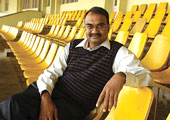 |
"You have to look
beyond numbers when you are speaking of cricket. It is the
only reach driver even in the current circumstances"
R. C. Venkateish
Managing Director, ESPN India |
Companies in India, both domestic and multinational,
provide ICC with about 75-80 per cent of its revenues and it is
depending quite heavily on the 2007 World Cup to recoup the massive
investments it has made; so, India's exit is not good news for
it. "The preparations for the ICC cricket World Cup began
in the West Indies even before the 2003 World Cup. The 2007 World
Cup has seen massive investments in stadiums and infrastructure
across the nine countries that will host the warm-up matches and
the event itself," says ICC's annual report for 2005-06.
The Economics of Cricket
SET earned about Rs 250 crore from the 2003
World Cup and is expected to make another Rs 350 crore this time.
The three Champions Trophy tournaments (2000, 2004 and 2006) and
subscription revenues are expected to generate another Rs 300
crore. That's Rs 900 crore against a total acquisition cost of
around Rs 1,100 crore. Sony is sitting on unsold inventory of
about 800 seconds per match, which it hoped to sell for Rs 50-55
crore. That would have made the transaction profitable for it.
But now, with advertisers demanding discounts, FCT and other freebies
even on sealed and signed deals, the fate (and value) of this
unsold inventory becomes uncertain. Is it, for example, willing
to hand over a part of this inventory to its advertisers to compensate
them for the losses they expect to suffer? "Our stance is
that there is no room for negotiations simply because these deals
are non-negotiable and non-cancellable. When two parties sign
a deal, it has to be honoured," points out Rohit Gupta, Executive
Vice President, SET.
Incidentally, the state-run Doordarshan,
which is also telecasting 16 matches (all the India matches, the
semi-final and the final), is said to have cut its asking rate
by about 25 per cent, following India's exit. There are also murmurs
that some media agencies are joining hands to renegotiate the
whole issue afresh with SET. How the story unfolds will be interesting
to watch.
Endorsements to be Hit
But advertising and broadcasting is only
one part of the story. There is a whole world of sports marketing
and endorsements that's worth about Rs 800 crore in India; and
cricket accounts for more than 90 per cent of this pie. The front
end of this universe is manned by the likes of Sachin Tendulkar,
Rahul Dravid, Sourav Ganguly, Mahendra Singh Dhoni, Yuvraj Singh
and Virender Sehwag. At the back end are the marketers, advertising
pros and manufacturing and services sector executives who conceptualise,
create and finance this set-up. This world will now shrink.
| WHAT IS AT STAKE FOR OUR
PLAYERS |
|
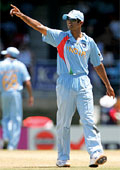 PLAYER:
Rahul Dravid PLAYER:
Rahul Dravid
FEE PER ENDORSEMENT PER YEAR: Rs
1-1.5 crore
KEY BRANDS ENDORSED: Hutch, Bank of Baroda, Max New
York Life, Castrol, Videocon
"When you commit money,
you have to factor in both wins and losses. It is important
to treat cricket as one of the opportunities to get across
to your customers"
Harit Nagpal
Director, Hutchison-Essar
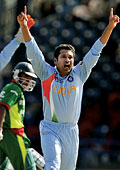 PLAYER:
Sachin Tendulkar PLAYER:
Sachin Tendulkar
FEE PER ENDORSEMENT PER YEAR: Rs
2.25-2.5 crore
KEY BRANDS ENDORSED: Sunfeast, Reliance Communications,
Pepsi, TVS Motors
"India not making it to the
Super 8 has definitely resulted in low levels of enthusiasm.
We will keep evaluating all options"
Ravi Naware
CEO, ITC's Foods Division
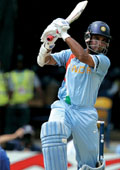 PLAYER:
Sourav Ganguly PLAYER:
Sourav Ganguly
FEE PER ENDORSEMENT PER YEAR: Rs
60-80 lakh
KEY BRANDS ENDORSED: Puma, Pepsi, Hero Honda
"We signed on Sourav for a
TV commercial which was to be shot later. We will be going
easy now and will focus on brand marketing instead"
Rajiv Mehta
Managing Director, Puma Sports India
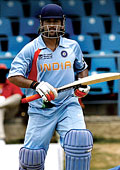 PLAYER:
Mahendra Singh Dhoni PLAYER:
Mahendra Singh Dhoni
FEE PER ENDORSEMENT PER YEAR: Rs
60-80 lakh
KEY BRANDS ENDORSED: Videocon, Reebok, Pepsi, Reliance
Communications, Brylcream
"We are extremely disappointed.
We have made big investments. For the next few months,we
will use only the commercial with Shah Rukh Khan"
Venugopal Dhoot
Chairman, Videocon Group
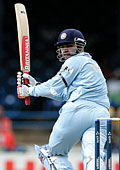 PLAYER:
Virender Sehwag PLAYER:
Virender Sehwag
FEE PER ENDORSEMENT PER YEAR:
Rs 45-50 lakh
KEY BRANDS ENDORSED: Pepsi
"If you do not play well,
you will automatically lose your contract. We have very
strong exit clauses in this business"
Latika Khaneja
Director, Collage Sports
|
For example, television manufacturers like
LG, Samsung, Videocon and others, who were hoping for an upswing
in sales during this World Cup, are expected to be stuck with
excess inventory. Collectively, TV manufacturers had invested
hundreds of crores on ad campaigns centered around the World Cup.
They will be hard put now to recoup this amount. LG has been with
the Indian cricket team since 2000 and the seven-year contract
ends with this World Cup. "Whatever purchases had to take
place would have taken place before the World Cup," says
LG's Vice President (Sales and Marketing), Girish Rao. Videocon's
Dhoot, however, admits that sales have been affected but declines
to reveal numbers. Interestingly, a large player like Samsung
has decided to focus on print media during the World Cup. Its
"Ek Size Bada Milega" campaign has a budget of Rs 10
crore, says the company spokesperson.
Says Shailendra Singh, Managing Director,
Percept D'Mark, a sports management company: "Cricket has
lost its credibility. We will need very strict exit clauses in
contracts and the base price will reduce." The fixed-to-variable
component, which was 90:10 till recently, is expected to change
to 60:40, he adds. Singh's firm handles brand endorsements and
sponsorships for players like Sourav Ganguly and Yuvraj Singh.
"Money will now go into other sports like football. We will
ask sponsors not to put all their eggs in one basket," he
says.
Interestingly, some of the larger advertisers
have decided not to use cricketers in their campaigns. Airtel
is one such; it has decided not to renew its contract with Sachin
Tendulkar and will stick with Shah Rukh Khan. "Of late, our
advertising has used sports, rather than cricket, as a category.
For instance, we have sponsored hockey at the national level.
We have not had much to do with the current World Cup," says
a company executive. Coke, too, has not adopted the cricket route.
"We did not pursue cricket or cricket stars for any short-term
gain during the World Cup," says the company spokesperson.
| BETTING: ILLEGAL BUT
THRIVING |
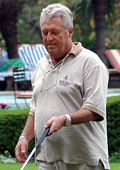 |
| Bob Woolmer: A
victim of betting? |
SET paid close to $250 million
(Rs 1,100 crore) for the 2003 and 2007 World Cups and three
Champions Trophy tournaments; this was dwarfed by ESPN's
bid of $1.1 billion (Rs 4,840 crore) for pretty much the
same number of matches between 2007 and 2015. The world
gasped in awe at these figures. But even the most conservative
estimates place the illegal betting economy during the current
World Cup at four times that figure. And if India had clashed
with Pakistan in the finals, that number would have gone
not just through the roof, but into orbit as well. The betting
for that one match could easily have topped $300 million
(Rs 1,320 crore). The unexpected defeats against minnows
and the early exit of the two teams are believed to have
cost the betting syndicate thousands of crores. It has been
reported that as much at Rs 300 crore was riding on the
India-Bangladesh match. Was it rigged? Experts say it is
difficult to rig entire matches as several players from
both the contesting teams have to be recruited. Given the
increased level of surveillance and scrutiny, this is a
difficult and dangerous venture to attempt.
But sophisticated new products, popular in stock markets
and in countries where betting is legal, are now being offered
on the illegal betting market as well. One such product
is "spread betting". This is how it works: If
you place a Rs 1,000 bet on Player A scoring, say 100-110
runs, and the player scores only 10, you lose Rs 90,000-1,00,000
(the 90-100 runs that the player fails to score multiplied
by Rs 1,000), plus your bet amount. Such bets are easier
to rig as all they require is one corrupt player to make
it possible.
The remedy: legalise betting, and put in place a regulator
along the lines of the one in the stock market. Legalising
gold imports wiped out gold smuggling. Legalising betting
is also likely to have the same effect. But it will still
be too late to save Pakistan coach Bob Woomer's life.
|
"The costs
(of cricket-related ads) had gone out of control and this jolt
was probably required. I see it as a wake-up call with respect
to risks," says Madison Media's CEO, Punitha Arumugam. She
handles the media services for clients such as Airtel, TVs Motors
and Coke. Pepsi, one of the largest advertisers, has taken its
advertisement with four Indian cricketers off the air. The company
concedes that its creative strategy was based on the Indian team
doing better. "In the light of India's performance, there
will be some changes in the short term as far as advertising is
concerned," says Punita Lal, PepsiCo India's ED, Marketing.
From a shorter-term perspective, tour operators,
who were hoping for a pick-up in sales of World Cup-related tour
packages and hotels and restaurants, which, typically, see a spike
in footfalls during matches featuring India, are also counting
their losses.
But not everyone is despondent. Indians,
after all, are a very emotional and forgiving lot; and many are
hoping that Team India will bounce back. "There is no change
in our cricket strategy and we are clear that cricket is a premium
product. The next World Cup will be played in the sub-continent
and we are optimistic about it," says R.C. Venkateish, Managing
Director, ESPN India, which paid $1.1 billion (Rs 4,840 crore)
for the rights to the 2011 and 2015 World Cups and three Champions
Trophies.
Victory of hope over experience? The answer
to that lies in the boardrooms of India Inc., which, many say,
have become the real sanctum sanctora of Indian, and, indeed,
world cricket.
-additional reporting by
Kapil Bajaj, Bibek Bhattacharya and Rishi Joshi
|





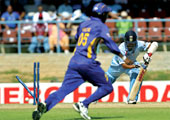
 Official
global sponsors
Official
global sponsors
 PLAYER:
PLAYER:
 PLAYER:
PLAYER:
 PLAYER:
PLAYER:
 PLAYER:
PLAYER:
 PLAYER:
PLAYER:
